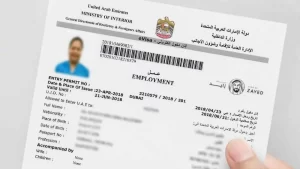The United Arab Emirates (UAE) is one of the most sought-after destinations for professionals from around the world. With its booming economy, tax-free salaries, and diverse work opportunities, many foreigners dream of securing a job and work permit in the UAE. However, navigating the process can be confusing if you don’t know where to start. This guide will walk you through the essential steps on how to obtain a UAE work permit.
Step 1: Secure a Job Offer
The first and most crucial step to obtaining a work permit in the UAE is to secure a job offer. You must have an employer who is willing to sponsor you. Without this sponsorship, you cannot legally work in the UAE. Employers often assist with the work permit process and will guide you through the necessary steps.
Once you’ve received a job offer, your employer will initiate the process by applying for a work permit (also known as a labor card) on your behalf. The work permit allows you to legally work in the UAE and is a requirement for obtaining a residence visa.
Step 2: Apply for a Work Permit
The next step in the process is the work permit application. Your employer, as the sponsor, is responsible for applying for the work permit. They will submit the necessary paperwork to the Ministry of Human Resources and Emiratisation (MOHRE), which handles labor matters in the UAE. The application includes information about the nature of the job, the employer, and the prospective employee.
Key documents that may be required for the work permit application include:
- A copy of your passport
- Passport-sized photographs
- Educational certificates or qualifications (attested if necessary)
- Employment contract or job offer letter
- Health and medical clearance
Once the application is submitted, the Ministry will process it and issue the work permit. This process typically takes a few days, although it may vary based on the industry and nationality of the applicant.
Step 3: Medical Examination and Health Insurance
Before your work permit is finalized, you will need to undergo a medical examination to ensure you are fit to work in the UAE. The examination usually includes tests for contagious diseases like HIV, tuberculosis, and hepatitis. The medical test can be done at authorized medical centers in the UAE, and the results are sent directly to the relevant authorities.
Along with the medical exam, health insurance is mandatory in the UAE, especially in cities like Dubai and Abu Dhabi. Your employer may provide health insurance as part of your employment package, but if not, you will need to arrange your own coverage.
Step 4: Apply for a Residence Visa
Once the work permit is approved, your employer will apply for your residence visa. This allows you to stay in the UAE for the duration of your employment. The residence visa also permits you to bring family members (if applicable) and enjoy certain benefits like opening a bank account, obtaining a driver’s license, and more.
The residence visa application typically involves submitting:
- Passport and photographs
- Work permit
- Medical test results
- Employment contract
Upon approval of the residence visa, you will receive a stamp on your passport, which permits you to legally reside and work in the UAE.
Step 5: Final Steps and Labor Card
Once you have your residence visa, you will receive a labor card (also known as a work card). This card is a legal requirement for foreign workers in the UAE, confirming your employment status and allowing you to legally work.
Your employer will provide you with the labor card, and this document should always be carried with you while working in the UAE.
Conclusion
Getting a work permit in the UAE involves securing a job offer, having your employer apply for a work permit, undergoing a medical test, and obtaining a residence visa and labor card. The process is relatively straightforward, but it requires attention to detail and the cooperation of your employer. With the right guidance and documentation, working in the UAE can be a rewarding experience that opens doors to exciting professional and personal opportunities.
